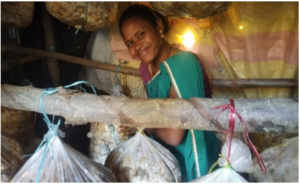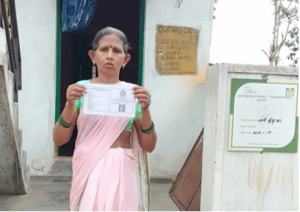Migration Support Service Centre Resolves Returnee Migrant Issues in Rayagada
Last year, when the unprecedented nation-wide lockdown was imposed, hundreds of migrant workers throughout the country lost their livelihood overnight. They had no work, no roof and no food with the blink of an eye. Walking thousands of miles in tattered chappals, migrants with their families marched towards their hometowns in despair in the scorching heat of late March. Some were brought back by the State Governments through trains and buses. These included many who returned to the tribal dominated undivided Koraput district in the southern part of Odisha, including Rayagada district,
Rayagada, covered with dense forest, hills and natural resources, is a home to major tribes like Kandhos, Jhodias and Souras who sustain widely on agriculture and collecting forest produces.Most parts of the district are untouched by development with low level of education and chronic poverty that has led many to migrate to different parts of the country in search of better livelihood options. The push owing to crop loss and heavy debt burden driving them into poverty.
The unforeseen return of large number of migrants posed multiple serious challenges to the state and civil society. Envisaging to ensure and protect the rights and entitlements of migrants in Rayagada, a Migration Support Service Centres (MSSCs) were set up by CYSD in collaboration with UNICEF. MSSC developed a database of migrants on the basis of age, gender and skill sets acquired by them and the details of their employers for tracking, monitoring and response.
The centre facilitated the registration of workers under Building and Other Construction Workers (BOCW), MGNREGS and inclusion in entitlements with the help of local government. It also tried to create an environment for inclusion of the children of the migrants in the social welfare schemes of the government, like the ICDS, ICPS, SSA, Kishori Shakti Yojana, Universal Immunization Programme, Biju Kanyaratna Yojana, Banishree, etc.
MSSC undertook activities for skilling and re-skilling of migrants and youths with a focus on prior learning of semi-skill migrants and development in the capacity of local governments towards integrating the needs of migrants, children, women and other distressed groups in Gram Panchayat Development Plan (GPDP) and monitoring at the local level.
 Harsha Kadraka, a 22-year-old returnee migrant who received Agri-based skill training on Mushroom cultivation from MSSC says that she is excited to sell her mushroom and earn Rs. 700 – 900 daily. “From a distress migrant to a self-employed has only been possible because of CYSD and UNICEF’s joint efforts” says delightful Harsha.
Harsha Kadraka, a 22-year-old returnee migrant who received Agri-based skill training on Mushroom cultivation from MSSC says that she is excited to sell her mushroom and earn Rs. 700 – 900 daily. “From a distress migrant to a self-employed has only been possible because of CYSD and UNICEF’s joint efforts” says delightful Harsha.
Besides, attempts were also made in strengthening the local institutions including Child protection committees; mobilizing Gram Panchayats (GPs) to strengthen infrastructures for children at Anganwadi Centres (AWCs) and schools, and facilitating community leadership development at source for safe migration.
The centre has been working towards ensuring better policy and programs for migrants in the context of inter-state registration portability of entitlement benefits. It is deeply engaged in exploring the opportunities for expanding and replicating the model.MSSC is currently functional in 10 Gram Panchayats of Kolanara Block of Rayagada district, namely, Kolanara, Rayagada, Suri, Dunduli, Gadiseshkhal, Bada Khilapadar, Jharidi, Bankili, Rekhapadar, Bhoimoda, Katikana covering 114 villages having 44677 population with 10174 HH. The Centre is benefiting 1049 migrants of 147 families from these 10 GPs.
The project is being implemented on the ground with the help of multiple-stakeholders, like concerned Sarpanch of 10 Gram Panchayats, 10 Samiti Sabhya (Members), 118 Ward Members, 10 PEOs, 10 JRS, 113 AWWs, 131 ASHA, 28 ANM, Medical Officer, BDO, WEO, BSSO, District Labour Officer, Block Chairperson, Community Resource Persons (Volunteers of CYSD-UNICEF) are a part of the initiative.
A total of 1046 migrants’ families are involved in this process; and about 586 new born babies have been registered in between January 2020 – December 2021.Initial intervention revealed that more than 5000 people were deprived of their basic social entitlements like, PDS, Pension, health insurance, Aadhar card, job cards, labour cards, Educational scholarships, immunization, birth and death registration, housing, drinking water, electricity and so on. The most affected of them were the migrant families. In order to address this problem, MSSC with multiple stakeholders’ collaboration intervened at the micro level through the ‘Single Window System’.
 Nedi Padmabati, a 45-year-old widow from Darabada village in Rayagada district says that she is grateful to have received a ‘Labour Card’ with the support of CYSD and UNICEF. “Being a widow, it has become very hard and worrisome for me to survive amidst Covid-19 pandemic with the burden of nurturing two children of mine”, says Nedi.
Nedi Padmabati, a 45-year-old widow from Darabada village in Rayagada district says that she is grateful to have received a ‘Labour Card’ with the support of CYSD and UNICEF. “Being a widow, it has become very hard and worrisome for me to survive amidst Covid-19 pandemic with the burden of nurturing two children of mine”, says Nedi.
The Labour card will make Nedi eligible in obtaining government benefits like; assistance in case of any accident, death benefit, pension, medical expenses for treatment, loans and advances for construction of own house, financial assistance for skill up-gradation, education for children, purchase of working tools, marriage of two dependent daughters and even assistance in funeral expense.Despite several initiatives, the number of distressed migrants has only seen a surge in the last two decades. The lockdown surfaced the problems of migrant workers and highlighted the dire need to ensure safety and security for 60 million people of the country who are inter-state labour migrants.
MSSC is a small joint effort by CYSD and UNICEF in Rayagada to solve the grassroots problems of Migrant returnee in dealing with the tsunami like issue. However, the necessity for similar initiatives holds special importance. It is the time to provide protection and care for greater outcomes. Projects like the MSSC need scale up, technical support and assistance in this mean time when the second wave of COVID-19 has already hit the state.
